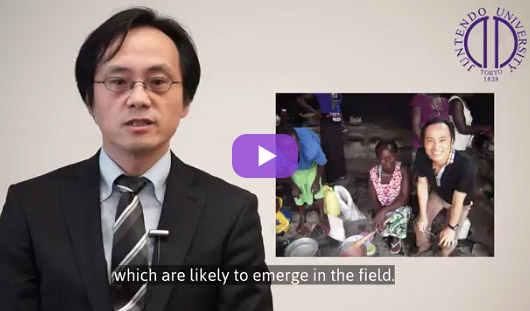Press Releases
April 23, 2018
Juntendo University Corporate Communications
Juntendo University Research
Malaria in Africa: Developing resistance
(Tokyo, 23 April 2018) Annual deaths from malaria are decreasing, but the disease is still a global health problem, with 216 million new cases estimated in 2016 alone, with 90% occurring in Africa. Toshihiro Mita from the Juntendo University School of Medicine in Tokyo, Japan, and colleagues report in Emerging Infectious Diseases an extensive study on the emergence of drug-resistant malarial parasites in northern Uganda.
Annual deaths from malaria are decreasing, but the disease is still a global health problem, with 216 million new cases estimated in 2016 alone. The emergence of drug resistance is one of the main threats in the global fight against malaria. Importantly, since 90% of malaria cases exist in Africa, the development of resistance to aremisinin — the major drug used to treat malaria — in this region would have profound consequences for global strategies to combat malaria.
Now, Toshihiro Mita from the Juntendo University School of Medicine in Tokyo, Japan, and colleagues report in Emerging Infectious Diseases an extensive study on the emergence of drug-resistant malarial parasites in northern Uganda.
The main reason why malaria incidence and deaths are decreasing is the deployment of combination therapies based on a drug called artemisinin. However, parasites can develop resistance to artemisinin, as was reported starting in 2007–2008, and resistance is known to be spreading in Southeast Asia. So far there was no evidence for the emergence of aremisinin-resistant parasites in Africa. However, in Africa many people have some form of immunity to malaria, thus they may respond to treatment even when infected by drug-resistant parasites.
Determining drug effectiveness based on conventional ex-vivo drug susceptibility assays is challenging, because reduced susceptibility to artemisinin is limited to the early ring stage of their development. A more recently developed survival assay, which evaluates ring-stage-specific reduction of artemisinin susceptibility is thus useful to study the emergence of drug resistance.
To assess artemisinin sensitivity in the period 2014–2016 in Gulu, a region with high malaria transmission in northern Uganda, the researchers performed 4 cross-sectional surveys and evaluated the emergence of artemisinin resistance by using 3 methods: conventional ex vivo drug susceptibility assay, the ring-stage-specific ex vivo survival assay and genotyping of the gene responsible for artemisinin resistance in Southeast Asia.
249 patients were enrolled in the study. Around 2% of the isolated parasites showed a high survival rate after being exposed to an artemisinin-derived drug, which is closely associated with delayed parasite clearance after drug treatment and is considered to be a proxy for the artemisinin-resistant parasite type. Only 1 of the parasites showed the genetic mutation associated with artemisinin resistance. The resistant parasites seem to have developed in Africa rather than migrated from Southeast Asia. Thus the study highlights the potential emergence of artemisinin-resistant parasites in Africa.
“Emergence and spread of artemisinin resistance impose substantial obstacles for effective malaria control and the approach toward elimination,” comment the authors in the paper. “It is thus imperative to perform further intensive surveillance for artemisinin resistance in various malaria-endemic regions in Africa and to elucidate genetic changes that confer resistance to artemisinin in parasites in Africa".

